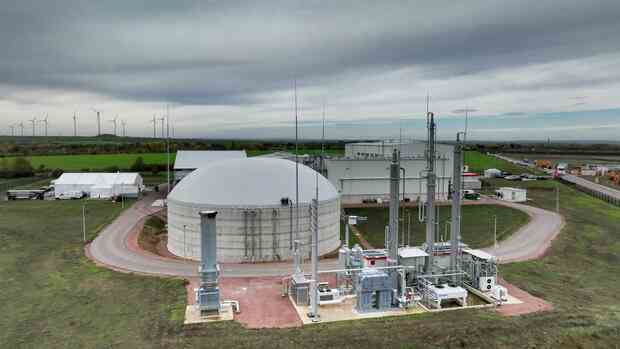These plans have been sharply criticized, particularly with regard to bioenergy.
(Photo: dpa)
Berlin From the point of view of the Union faction, the planned price brakes for electricity and gas still have room for improvement. The change requests concern the aid for the industry, but also the skimming off of proceeds from renewable energies.
Andreas Jung (CDU), climate and energy policy spokesman for the CDU faction, warns of the danger that the price brakes will come to nothing for large parts of the energy-intensive industry: “Due to high hurdles and upper limits, many companies fall through the cracks. The traffic light must consistently exploit the national scope and renegotiate in the EU: jobs, value creation and supply chains are at stake,” Jung told the Handelsblatt.
In a draft of an application available to the Handelsblatt, which the Union faction wants to decide on Tuesday afternoon, it says that the federal government must work to change the European subsidy framework. In particular, the Union is concerned with adjusting the maximum limits for companies with very high consumption and the criterion of the Ebitda decline.
The planned price brakes provide for a maximum subsidy limit of 150 million euros for a single company. Also, according to the current draft law, a company that wants to claim the full subsidy must see a more than 40 percent drop in earnings before taxes, depreciation and amortization (Ebitda) between February 1, 2022 and the end of December 2023. In other words, the company must promise a certain drop in profits when it submits the application and thus in advance.
Top jobs of the day
Find the best jobs now and
be notified by email.
From the Union’s point of view, this is unacceptable. However, the federal government points out that the regulations follow EU state aid law. Federal Economics Minister Robert Habeck (Greens) recently emphasized that he no longer saw any room for negotiations with the EU Commission in this regard. The government has already exhausted all options.
Criticism with regard to bioenergy
The Union would also like changes with regard to the planned skimming off of proceeds from renewable energies. “The skimming off of fictitious earnings instead of real profits will lead to collateral damage from the energy transition. Projects are already being put on hold,” said Jung. “A setback for energy security and a blow to climate protection must be averted. Investments must be counted towards the levy amount and bioenergy must be excluded entirely,” Jung added. In the case of bioenergy, higher yields are offset by exploding costs.
Many companies would fall through the cracks when it came to the aid.
(Photo: obs)
According to the plans of the traffic light coalition, certain upper revenue limits are to be defined for electricity generation from renewable sources, which vary according to the type of generation. Above the respective limits, 90 percent of the proceeds are to be skimmed off.
With a view to bioenergy in particular, these plans are being sharply criticized because the operators of the systems – unlike the operators of wind farms or photovoltaic systems – have to contend with sharp increases in costs.
Another point of criticism from the Union concerns the planned cancellation of the avoided network charges. So far, the operators of plants with combined heat and power (CHP) and local public transport companies have benefited from the avoided network charges: Since CHP plants and also trams or suburban trains only use the local power grid, they do not burden the higher-level network levels. In return, the system operators receive a payment from the network operator: the avoided network charges – i.e. a kind of reward for making minimal use of the electricity network.
The Federal Ministry of Economics now wants to completely overturn this regulation, which has been controversial for years. According to the ministry, the privilege has so far brought the beneficiaries a total of one billion euros in cost savings per year.
However, the relief is an integral part of the cost calculation of many companies. The Association of Municipal Companies (VKU) and the Association of German Transport Companies (VDV) are therefore heavily criticizing the planned deletion. It is likely that the traffic light coalition will take up the criticism and reverse the planned deletion.
>> Read here: How the industry wants to change the price brakes
From the point of view of the Union, this step is essential. “Cogeneration is a reliable partner for volatile renewable energies. If network charges are being imposed here now, the economic basis will be damaged and trust destroyed,” warns Jung. “In the middle of the crisis, important capacities are willfully throttled and energy security is endangered,” said the Union politician.
More: This is how the construction of the LNG terminals in Germany is progressing
